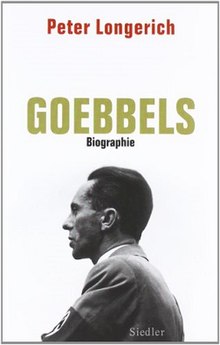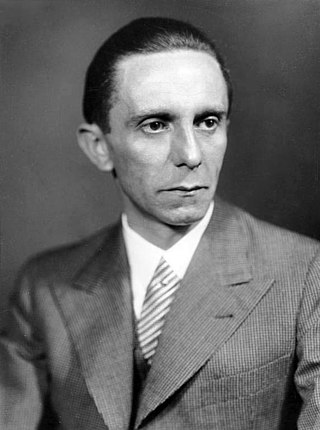
Paul Joseph Goebbels was a German Nazi politician and philologist who was the Gauleiter of Berlin, chief propagandist for the Nazi Party, and then Reich Minister of Propaganda from 1933 to 1945. He was one of Adolf Hitler's closest and most devoted followers, known for his skills in public speaking and his deeply virulent antisemitism which was evident in his publicly voiced views. He advocated progressively harsher discrimination, including the extermination of the Jews in the Holocaust.

Gregor Strasser was a German politician and early leader of the Nazi Party. Along with his younger brother Otto, he was a leading member of the party's left-wing faction, which brought them into conflict with the dominant faction led by Adolf Hitler, resulting in his murder in 1934. The brothers' strand of the Nazi ideology is known as Strasserism.

The Sportpalast speech or Total War speech was a speech delivered by German Propaganda Minister Joseph Goebbels at the Berlin Sportpalast to a large, carefully selected audience on 18 February 1943, as the tide of World War II was turning against Nazi Germany and its Axis allies. The speech is particularly notable as Goebbels almost mentions the Holocaust, when he begins saying "Ausrotten", but quickly changes it to "Ausschaltung". This was the same word Heinrich Himmler used on 18 December 1941, when he recorded the outcome of his discussion with Adolf Hitler on the Final Solution, wherein he wrote "als Partisanen auszurotten".
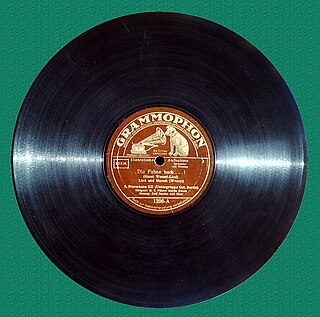
The "Horst-Wessel-Lied", also known by its opening words "Die Fahne hoch", was the anthem of the Nazi Party (NSDAP) from 1930 to 1945. From 1933 to 1945, the Nazis made it the de-facto co-national anthem of Nazi Germany, along with the first stanza of the "Deutschlandlied".

Johanna Maria Magdalena "Magda" Goebbels was the wife of Nazi Germany's Propaganda Minister Joseph Goebbels. A prominent member of the Nazi Party, she was a close ally, companion, and political supporter of Adolf Hitler. Some historians refer to her as the unofficial "first lady" of Nazi Germany, while others give that title to Emmy Göring.

Karl August Hanke was an official of the Nazi Party (NSDAP) during its rule over Germany who served as the fifth and final Reichsführer of the Schutzstaffel (SS). He also served as Gauleiter of Gau Lower Silesia from 1941 to 1945 and as Oberpräsident of the Prussian Province of Lower Silesia. Captured on 6 May 1945, he was shot and wounded during an escape attempt and then beaten to death by Czech guards on 8 June, after the war had ended.

Emma Johanna Henny "Emmy" Göring was a German actress and the second wife of Luftwaffe Commander-in-Chief Hermann Göring. She served as Adolf Hitler's hostess at many state functions and thereby staked a claim to the title of "First Lady of the Third Reich", a title also sometimes conferred upon Magda Goebbels.

Heinz Peter Longerich is a German professor of history and historian. He is regarded by Ian Kershaw, Richard Evans, Timothy Snyder, Mark Roseman and Richard Overy, as one of the leading German authorities on the Holocaust.

Ludwig Steeg was a German Nazi politician who was the Oberbürgermeister and Stadtpräsident of Berlin during the Third Reich.

The Goebbels Diaries are a collection of writings by Joseph Goebbels, a leading member of the National Socialist German Workers Party (NSDAP) and the Reich Minister of Public Enlightenment and Propaganda in Adolf Hitler's government from 1933 to 1945. The diaries, which have only recently been published in full in German and are available only in part in English, are a major source for the inner history of the Nazi Party and of its twelve years in power in Germany. The British historian Ian Kershaw wrote in the preface to his biography of Hitler: "For all the caution which must naturally be attached to Goebbels's regularly reported remarks by Hitler ... the immediacy as well as the frequency of the comments makes them a vitally important source of insight into Hitler's thinking and action."
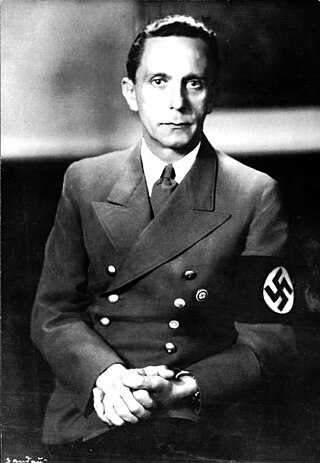
The Reich Ministry for Public Enlightenment and Propaganda, also known simply as the Ministry of Propaganda, controlled the content of the press, literature, visual arts, film, theater, music and radio in Nazi Germany.
The Green Post was a German newspaper from the Ullstein publishing house. Operations began on 10 April 1927, and the paper enjoyed a quick rise in popularity in all social classes, reaching a circulation of over one million during its first year. Its founder was a future travel writer and journalist Richard Katz. Its editor was Ehm Welk, who would be later known for his work Die Heiden von Kummerow.

Wehrmachtbericht was the daily Wehrmacht High Command mass-media communiqué and a key component of Nazi propaganda during World War II. Produced by the Propaganda Department of the OKW, it covered Germany's military situation and was broadcast daily on the Reich Broadcasting Corporation of Nazi Germany. All broadcasts were authorized by the Reich Ministry of Propaganda under Joseph Goebbels. Despite the latter's attempts to temper excessive optimism, they often exaggerated the success of the German armed forces, the Wehrmacht, leading historian Aristotle Kallis to describe their tone as "triumphalist".
The Reich Chancellery meeting of 12 December 1941 was an encounter between Adolf Hitler and the highest-ranking officials of the Nazi Party. Almost all important party leaders were present to hear Hitler declare the ongoing destruction of the Jewish race, which culminated in the Holocaust. The meeting is less known than the later Wannsee Conference.
Michael: A German Destiny in Diary Form (ISBN 0941693007) is a semi-autobiographical novel authored by the German propagandist Joseph Goebbels, it was rejected for publication but later published in 1929 by NSDAP officials against Goebbels' wishes. It is a three-part work of which only Parts I and III have survived. The novel is a combination of Goebbels' own thoughts and the life of his best friend Richard Flisges who had actually fought in World War I, and later ended his college studies to work in a mine where he died in an accident. That is what happens to the novel's protagonist Michael who meets his "sacrificial death" on 30 January 1921.
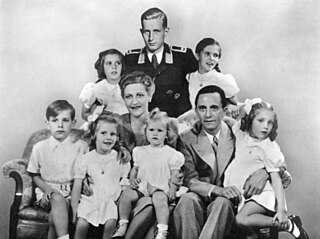
The Goebbels children were the five daughters and one son born to Nazi propaganda minister Joseph Goebbels and his wife Magda Goebbels. The children, born between 1932 and 1940, were murdered by their parents in Berlin on 1 May 1945, the day both parents committed suicide.
Axel Herbert Ewald Ripke was a German journalist and politician of the German Fatherland Party and the Nazi Party (NSDAP). Among other things, he was one of the first Gauleiters of the NSDAP and an early mentor of Joseph Goebbels.

Richard Friedländer was a German Jewish merchant and Holocaust victim.

During a speech at the Reichstag on 30 January 1939, German Führer Adolf Hitler threatened "the annihilation of the Jewish race in Europe" in the event of war:
If international finance Jewry inside and outside Europe should succeed in plunging the nations once more into a world war, the result will be not the Bolshevization of the earth and thereby the victory of Jewry, but the annihilation of the Jewish race in Europe.
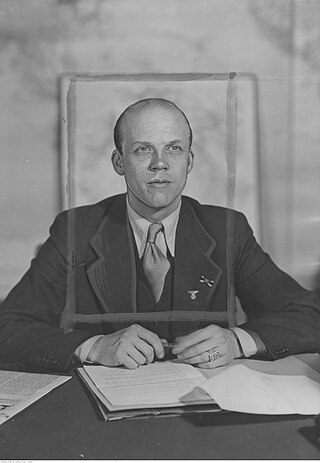
Karl Bömer was a German ministerial director and the head of the Foreign Department for Journalism in the Ministry of Propaganda. His accidental hint at German plans to invade the USSR led to his arrest by the Gestapo in May 1941. Subsequently, he fought on the Eastern Front in 1942 and sustained injuries near Kharkov; Bömer died in a military hospital in Kraków.
